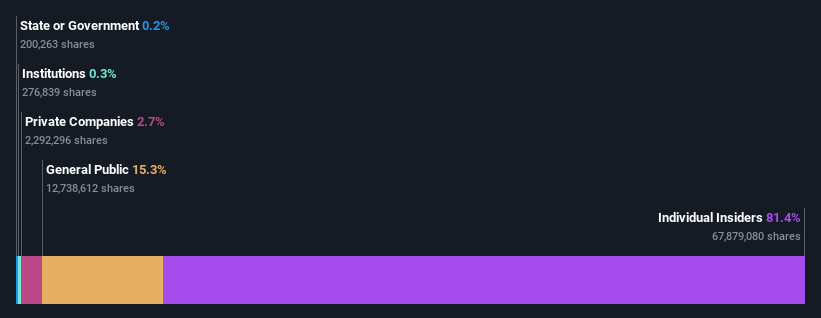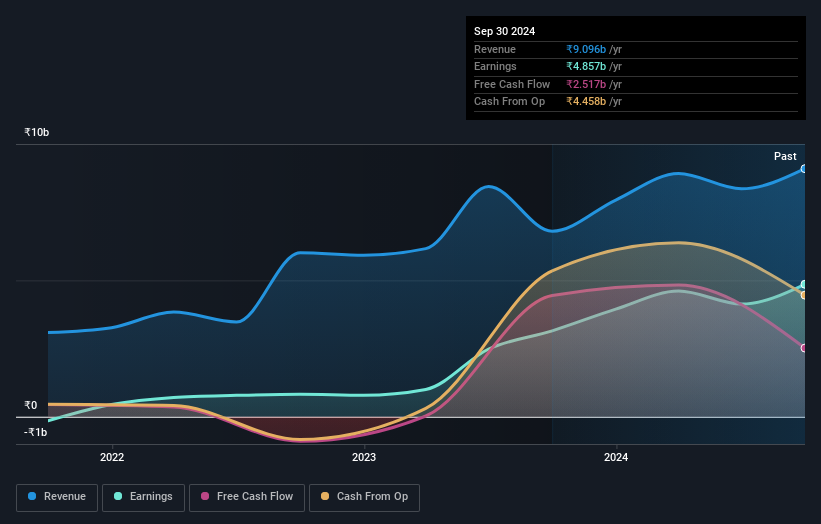- India
- /
- Real Estate
- /
- NSEI:GANESHHOUC
Ganesh Housing Corporation Limited (NSE:GANESHHOUC) CEO Shekhar Patel, the company's largest shareholder sees 10% reduction in holdings value

Key Insights
- Significant insider control over Ganesh Housing implies vested interests in company growth
- A total of 2 investors have a majority stake in the company with 72% ownership
- Ownership research, combined with past performance data can help provide a good understanding of opportunities in a stock
To get a sense of who is truly in control of Ganesh Housing Corporation Limited (NSE:GANESHHOUC), it is important to understand the ownership structure of the business. And the group that holds the biggest piece of the pie are individual insiders with 81% ownership. That is, the group stands to benefit the most if the stock rises (or lose the most if there is a downturn).
As a result, insiders as a group endured the highest losses after market cap fell by ₹11b.
Let's take a closer look to see what the different types of shareholders can tell us about Ganesh Housing.
View our latest analysis for Ganesh Housing

What Does The Lack Of Institutional Ownership Tell Us About Ganesh Housing?
Small companies that are not very actively traded often lack institutional investors, but it's less common to see large companies without them.
There are multiple explanations for why institutions don't own a stock. The most common is that the company is too small relative to funds under management, so the institution does not bother to look closely at the company. Alternatively, there might be something about the company that has kept institutional investors away. Ganesh Housing might not have the sort of past performance institutions are looking for, or perhaps they simply have not studied the business closely.

We note that hedge funds don't have a meaningful investment in Ganesh Housing. With a 37% stake, CEO Shekhar Patel is the largest shareholder. With 35% and 3.8% of the shares outstanding respectively, Dipakkumar Patel and Nrupal Shah are the second and third largest shareholders. Interestingly, the second-largest shareholder, Dipakkumar Patel is also Top Key Executive, again, pointing towards strong insider ownership amongst the company's top shareholders.
A more detailed study of the shareholder registry showed us that 2 of the top shareholders have a considerable amount of ownership in the company, via their 72% stake.
While studying institutional ownership for a company can add value to your research, it is also a good practice to research analyst recommendations to get a deeper understand of a stock's expected performance. As far as we can tell there isn't analyst coverage of the company, so it is probably flying under the radar.
Insider Ownership Of Ganesh Housing
The definition of company insiders can be subjective and does vary between jurisdictions. Our data reflects individual insiders, capturing board members at the very least. The company management answer to the board and the latter should represent the interests of shareholders. Notably, sometimes top-level managers are on the board themselves.
I generally consider insider ownership to be a good thing. However, on some occasions it makes it more difficult for other shareholders to hold the board accountable for decisions.
Our most recent data indicates that insiders own the majority of Ganesh Housing Corporation Limited. This means they can collectively make decisions for the company. Given it has a market cap of ₹97b, that means insiders have a whopping ₹79b worth of shares in their own names. Most would argue this is a positive, showing strong alignment with shareholders. You can click here to see if they have been selling down their stake.
General Public Ownership
The general public, who are usually individual investors, hold a 15% stake in Ganesh Housing. While this size of ownership may not be enough to sway a policy decision in their favour, they can still make a collective impact on company policies.
Next Steps:
While it is well worth considering the different groups that own a company, there are other factors that are even more important. To that end, you should be aware of the 1 warning sign we've spotted with Ganesh Housing .
If you would prefer check out another company -- one with potentially superior financials -- then do not miss this free list of interesting companies, backed by strong financial data.
NB: Figures in this article are calculated using data from the last twelve months, which refer to the 12-month period ending on the last date of the month the financial statement is dated. This may not be consistent with full year annual report figures.
New: Manage All Your Stock Portfolios in One Place
We've created the ultimate portfolio companion for stock investors, and it's free.
• Connect an unlimited number of Portfolios and see your total in one currency
• Be alerted to new Warning Signs or Risks via email or mobile
• Track the Fair Value of your stocks
Have feedback on this article? Concerned about the content? Get in touch with us directly. Alternatively, email editorial-team (at) simplywallst.com.
This article by Simply Wall St is general in nature. We provide commentary based on historical data and analyst forecasts only using an unbiased methodology and our articles are not intended to be financial advice. It does not constitute a recommendation to buy or sell any stock, and does not take account of your objectives, or your financial situation. We aim to bring you long-term focused analysis driven by fundamental data. Note that our analysis may not factor in the latest price-sensitive company announcements or qualitative material. Simply Wall St has no position in any stocks mentioned.
About NSEI:GANESHHOUC
Ganesh Housing
Engages in the real estate and construction businesses in India.
Flawless balance sheet with solid track record and pays a dividend.
Market Insights
Community Narratives



